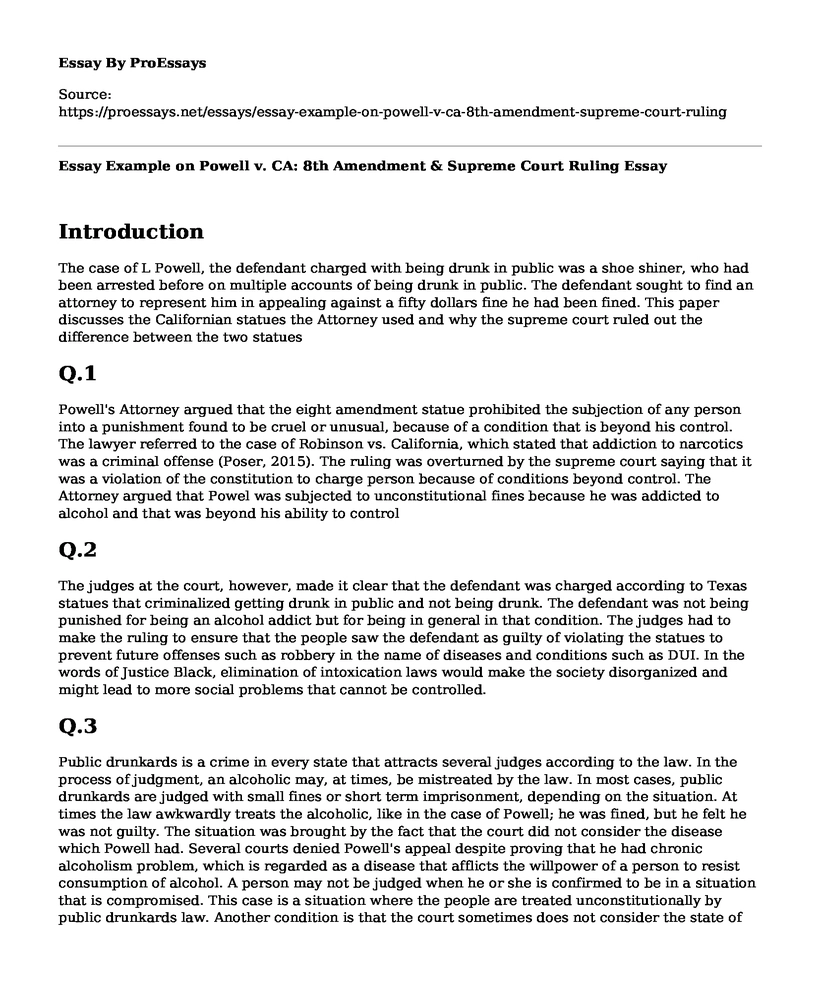Introduction
The case of L Powell, the defendant charged with being drunk in public was a shoe shiner, who had been arrested before on multiple accounts of being drunk in public. The defendant sought to find an attorney to represent him in appealing against a fifty dollars fine he had been fined. This paper discusses the Californian statues the Attorney used and why the supreme court ruled out the difference between the two statues
Q.1
Powell's Attorney argued that the eight amendment statue prohibited the subjection of any person into a punishment found to be cruel or unusual, because of a condition that is beyond his control. The lawyer referred to the case of Robinson vs. California, which stated that addiction to narcotics was a criminal offense (Poser, 2015). The ruling was overturned by the supreme court saying that it was a violation of the constitution to charge person because of conditions beyond control. The Attorney argued that Powel was subjected to unconstitutional fines because he was addicted to alcohol and that was beyond his ability to control
Q.2
The judges at the court, however, made it clear that the defendant was charged according to Texas statues that criminalized getting drunk in public and not being drunk. The defendant was not being punished for being an alcohol addict but for being in general in that condition. The judges had to make the ruling to ensure that the people saw the defendant as guilty of violating the statues to prevent future offenses such as robbery in the name of diseases and conditions such as DUI. In the words of Justice Black, elimination of intoxication laws would make the society disorganized and might lead to more social problems that cannot be controlled.
Q.3
Public drunkards is a crime in every state that attracts several judges according to the law. In the process of judgment, an alcoholic may, at times, be mistreated by the law. In most cases, public drunkards are judged with small fines or short term imprisonment, depending on the situation. At times the law awkwardly treats the alcoholic, like in the case of Powell; he was fined, but he felt he was not guilty. The situation was brought by the fact that the court did not consider the disease which Powell had. Several courts denied Powell's appeal despite proving that he had chronic alcoholism problem, which is regarded as a disease that afflicts the willpower of a person to resist consumption of alcohol. A person may not be judged when he or she is confirmed to be in a situation that is compromised. This case is a situation where the people are treated unconstitutionally by public drunkards law. Another condition is that the court sometimes does not consider the state of the accused at the time of the arrest. A person is deemed to have violated the law if he or she is under the influence of alcohol in public and causing disturbance; however, the law does not define what makes a place open. Therefore the judge may find a person guilty of being intoxicated in a private home and consider it a public place.
Conclusion
In conclusion, Powell's case served as an example of the many controversial cases of public drunkards and showed that there is much to be done to bring such matters to fairness. Despite Powell efforts to prove him innocent by going ahead and filling several appeals; he lost the case even though he brought enough evidence to prove his innocence.
Work Cited
Prosser, William L. Law of torts. Review.2015.
Cite this page
Essay Example on Powell v. CA: 8th Amendment & Supreme Court Ruling. (2023, Feb 09). Retrieved from https://proessays.net/essays/essay-example-on-powell-v-ca-8th-amendment-supreme-court-ruling
If you are the original author of this essay and no longer wish to have it published on the ProEssays website, please click below to request its removal:
- Social Policy Issue: Food Stamps Essay
- Coalition for Human Immigration Rights of Los Angeles Paper Example
- Ridiculous Civil Lawsuit Essay Example
- Social Problem: Neglected Conditions of Schools in Non-White and Poor Neighborhoods
- DHS Homeland Security Intelligence Center Essay Example
- Sid & Nancy's Ferry Injury Lawsuit: Identifying Legal Principles - Essay Sample
- Challenges and Initiatives: Addressing Systemic Racism in Canadian Sports - Free Paper Example







